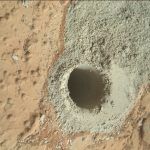
20th May 2013 Sol 280
Here is a MAHLI image of our second drill hole at Cumberland. Like the first drill hole it shows the difference between the reddish uppermost surface of Mars and what lies underneath. This drill hole area has a difference in that there are more unusual, rounded concretions than at the first site. Their mineralogy is likely […]
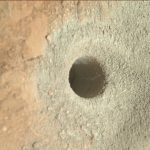
12th May 2013 Sol 272
Here is an image of the drillhole, and the tailings around it, taken by the MAHLI microimager on the robotic arm. In the tailings pile and within the hole (it is 1.6 cm deep) you can a light mineral; this is the sort of visual information that is important in interpreting the drill hole and John […]
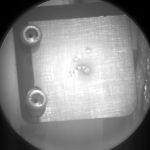
3rd May 2013 Sol 263
Our first image has come back after conjunction. Here is the Chemcam remote microimager (RMI) of our titanium calibration target. We use this target, of known composition, to calibrate our ChemCam elemental analyses. Analysing this is one of our routine activities. You can see the spots on it left by the near infrared laser.
29th April 2013 Sol 260
Mars is not out of conjunction yet, so, we are only getting short, small data volumes of communication from Curiosity. However, that is exactly what we expected so we are confident that before too long we will get back to full science operations.
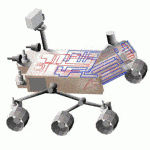
April 19th 2013 Sol 250
Even though Curiosity and its robotic arm are parked during Conjunction, the thermal control system continues to operate. Through the martian seasons (currently southern summer) Curiosity has to survive a temperature range of -120oC to +30oC. The engineers who build the thermal control system (Birur et al. From Concept to Flight: An Active Fluid Loop Based Thermal Control […]
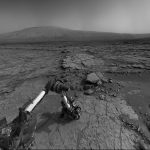
April 9th 2013 Sol 240
We have now moved into the Solar Conjunction phase, so there will be fewer operational activities for the next few weeks. We are parked at the John Klein site during this time. This is a navigational camera image of the arm deployed over our first drill site.
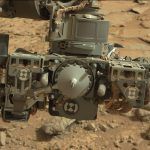
March 30th 2013 Sol 231
We are now back to full operations after the software problems, and getting in observations prior to the planetary conjunction. This also gives us the opportunity to analyse the samples in CheMin for longer, the more X-ray photons that the ChemMin CCD detects, the more confident we can be of the accuracy of mineral percentages at […]
March 20th 2013 Sol 221
On April 18th there will be a Mars solar conjunction, when Mars and Earth are on opposite sides of the Sun. This occurs every 26 months ie the length of the Mars year. That means that although the rover’s memory is fixed, we will not be able to do our normal full science activities for […]
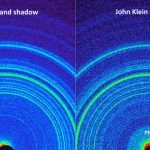
March 14th 2013 Sol 215
The results from our drill hole are showing that the John Kein rocks include mudstone, with about 20% of it composed of a clay called smectite. Clays form in the presence of water and we know that this mineral often forms from neutral to mildly alkaline brines, typically at <100oC. The high percentage of clay suggests […]
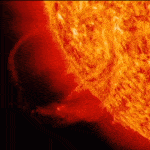
March 7th 2013 Sol 208
A natural hazard for all spacecraft, including MSL, is currently at Mars. On March 5th there was a large solar flare or ‘Coronal Mass Ejection’. This sent out a stream of plasma from the Sun – which has now reached Mars. The radiation associated with this could damage active circuitry so Curiosity has been kept in a low activity […]

 Subscribe to jbridges's posts
Subscribe to jbridges's posts
Recent Comments